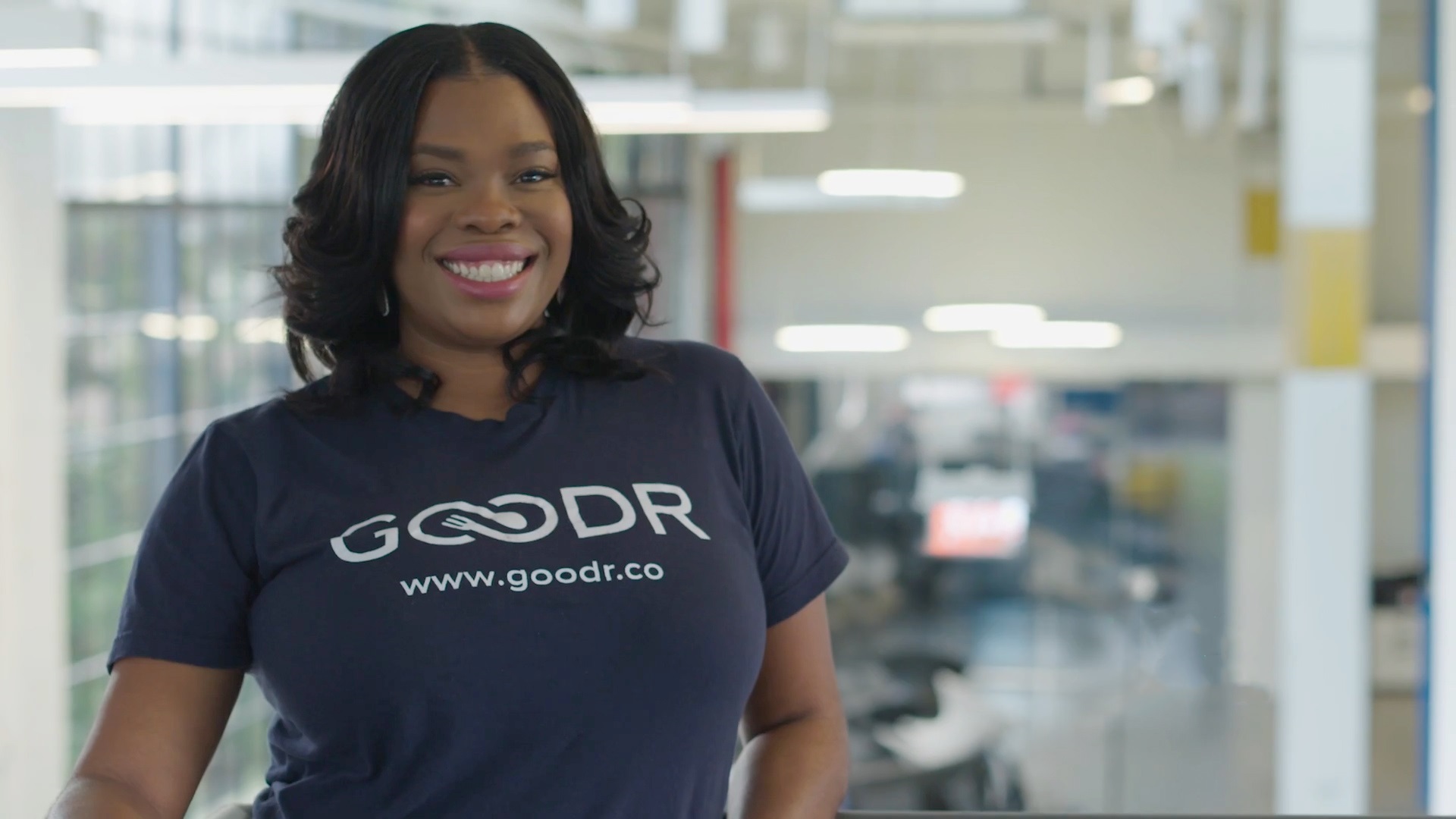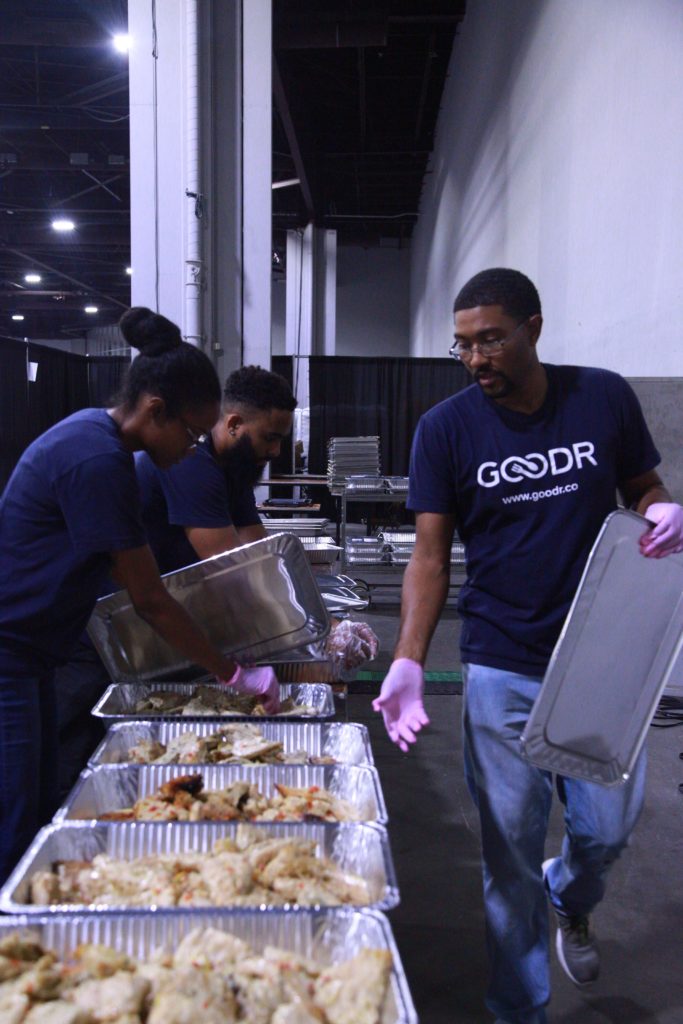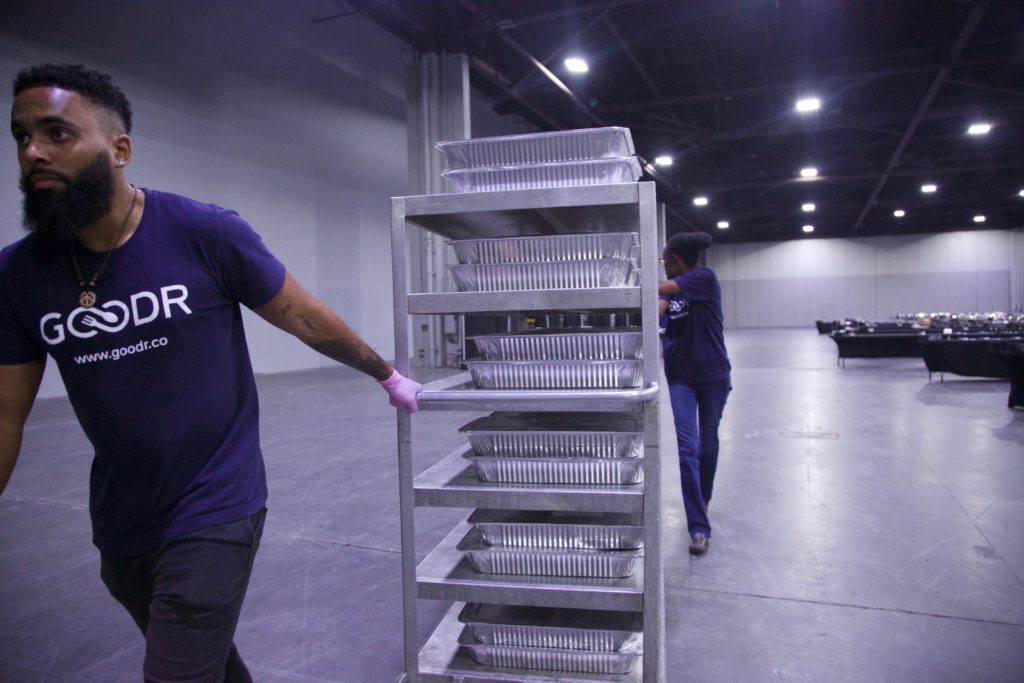Before she founded a profit-for-good corporation that helps other companies strive for zero waste – which has so far diverted more than 2 million pounds of surplus food from landfills (about 1.8 million meals) – Jasmine Crowe used to feed people experiencing homelessness directly from the kitchen of her small one-bedroom apartment in Atlanta, something she called Sunday Soul.
For three and a half years, she cut coupons, price matched and shopped at three to four grocery stores and farmer’s markets, then spent 15-20 hours to make the bi-weekly meal (4-6 entrees, 10-ish side dishes, desserts and bread) for 250-500 people. She would then load up her car and drive the food to senior homes, shelters, parks, under bridges and alleyways.
“A video of one of my pop up restaurants went viral on Facebook and I woke up one day to millions of views, friend requests and I was reading through the comments, and one of the recurring questions people kept asking me was, ‘Who donates the food?’ And the reality was nobody,” she says. “And I started thinking, why aren’t restaurants donating the food? So, I started researching food waste.”
She found that nearly 75 billion pounds of perfectly good food is wasted every year in America – which amounts to about $218 billion a year spent in the U.S. on food that people never eat.
“The idea that hunger is an issue of scarcity and we need to produce more food is false,” says Crowe, who founded Goodr in 2017 as a sustainable food waste management company that leverages technology to solve hunger and food waste. “What I look at hunger being is an issue of logistics, and so Goodr is solving what I call the surplus food supply chain problem.”
With many schools across the country closing, it’s cut off children who depended on those lunches. Goodr has partnered with Atlanta Public Schools to help deliver meals and groceries to more than 40,000 students. They continue to recover and redirect surplus food from several states as locations close across the country. Crowe is fielding many requests to replicate what Goodr is doing around the country and is in the process of creating a webinar/playbook to make that available on the company’s LinkedIn profile in the next month. The organization is working at capacity at this time and giving full attention to its mission of “Feeding more and wasting less.” Find out more, including how to support Goodr’s efforts.
At the same time she was about to start Goodr, food delivery apps were gaining popularity in Atlanta. She wondered how technology had evolved to get food faster to people, but not to get food to people who are hungry and can’t afford such services. She wanted to focus on that.
Goodr connects businesses that have surplus food to nonprofit organizations and people who need it and does it in a way that’s almost like the reverse of those food delivery services. Goodr developed a mobile app to do this that also takes advantage of the shared gig economy. Drivers work with Goodr to pick up the food and make deliveries to a nonprofit, typically within a three to five-mile radius.
The food includes prepared and packaged meals such as sandwiches, salads and fruit cups; but also cooked chicken, pasta and steak – pretty much whatever they can recover.
Goodr’s secure chain of custody gives their business clients the ability to track, account for and manage their surplus food and organic waste. Goodr’s platform, which uses Microsoft Azure, provides predictive data to improve buying and production decisions.
“This dashboard platform that we’ve built allows customers to get real, tangible insights on the food waste that they’ve never measured before. So what we’re able to help them see is items that they’re constantly wasting, so that they can make better decisions on their food production,” Crowe says. “We’re also able to show them who the food goes to, which kind of causes and nonprofits that they’re supporting. And then we give them all of the tax data for everything it is that they’ve donated, so that at the end of the year all they have to do is run a report, give it to the CPA, and now they can write off all of their food donations.”
When Crowe began this journey with Goodr, she didn’t have any experience with the kind of technology it would take to make all this happen. Businesses would text her, tell her they had food and she would pick it up.
“I had absolutely no technical background when founding Goodr, and I would say that in the beginning, that was a real hurdle for me. I would be meeting with potential app developers, and I wasn’t really able to convey the user’s story,” she says. “It’s been a real big journey for me.”
An alumna of North Carolina Central University (a historically black university), Crowe says the importance of service was built into the core of that institution. While she has a broadcast journalism degree as well as an MBA, her professional background has been rooted in the nonprofit space, as she’s worked to help celebrities create and launch nonprofits, form boards and implement programming for more than a decade.
Going from zero to 60 in a hurry seems to be a pattern in Crowe’s life. Her first big culinary foray happened when she couldn’t afford to go home to Portland, Oregon, one Thanksgiving, back when she was in college. She decided to turn the prospect of a lonely Thanksgiving into a holiday dinner for others who couldn’t go home. Using a Betty Crocker cookbook, she and her roommate whipped up a meal for 18 people that included turkey, ham, chicken and side dishes.
Flash forward to her current focus on food. Throughout 2017 she entered pitch competitions, trying to win prize money to build the technology to gather and disperse surplus food. By the end of that year, she had raised about $200,000. Then she spent the first quarter of 2018 building the technology, launching Goodr in March 2018.
When Goodr opened its first office, Crowe used a promotion through her credit card to buy supplies, including Dell UltraSharp monitors and Dell XPS 13 laptops, which have become her go-to travel device. That led to a partnership with Dell to create technology hubs within the office. A lifelong Dell user, she adapted easily to the devices in her new workplace.
She remembers using Dell computers in her school libraries, in college and in her early job years. Now, it’s a must-have for her busy life.
“Dell technology has helped me stay on top of things from day-to-day,” says Crowe. “One of the things I love most about the XPS 13 is just how powerful it is and how I can do multiple things on it because you’ve got to imagine, I’m running payrolls sometimes, I’m checking thousands of emails, I’m sending marketing campaigns, I’m managing social media, so being able to have multiple tabs open, hit one button, see everything that I have going on is amazing. But also, I think the speed of the XPS 13 has been amazing for me because I need things that move fast. I’m traveling, I’m going all over the country, I’m trying to speak and educate people about hunger. So, the thing that I need most is the technology that supports me.”
Crowe also considers Dell to be aligned with Goodr in other ways.
“When I learned how sustainable Dell was trying to be, that was something that just really made me more attuned to want to work with them because we’re a sustainability company,” she says of Dell’s commitment to shrinking its footprint, which includes its supply chain, water mitigation and recycling.
Goodr has a team of 17 on its staff, but it’s growing. She hopes to have 25 full-time employees by the end of 2020. The Atlanta-based company is in seven markets, including Charlotte, North Carolina; Philadelphia; Miami; Chicago; Los Angeles; and Seattle. The goal is to be in 20 markets by the end of 2020.
Because she’s still in Atlanta, from time to time she runs into people she used to help while doing Sunday Soul.
“We were dropping off food at a nonprofit in Atlanta, and this lady’s like, ‘Oh my God, there’s Miss Jasmine! She used to feed me on the streets.’ I mean, she got so excited, and she runs up to me, and she’s telling me how things have really turned around for her now. She’s working at the nonprofit, her and her son have an apartment, they’re on a waiting list to get housing, she’s in counseling, and it just really touched me because she remembered me probably from three to four years ago,” Crowe says. “Because we remember all of our favorite restaurants, we remember experiences that help shape us, and so I like to think that through Sunday Soul and through Goodr, we’ve shaped a lot of people’s lives.”
Find out more about Goodr on its website, Instagram, Twitter and LinkedIn.
Editor’s note: This story was originally published on March 12, 2020 and updated April 13, 2020 with additional details about Goodr’s efforts to provide food for families while schools are closed.
Lead photo: Jasmine Crowe, founder and CEO of Goodr (Photo courtesy of Goodr)



